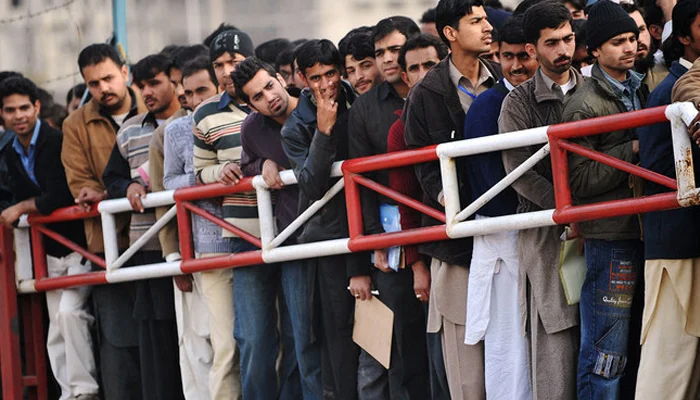Reliving a historical blunder
More than half of its 240 million people are below the age of 21
Recent political developments have rightly upset many Pakistanis, who feel that they are being systematically disenfranchised and deprived of a role in determining their future. But those beholden to social media as their primary source of information wrongly believe that the current happenings are somehow unique or are occurring for the first time.
By global standards, Pakistan has a very young population. More than half of its 240 million people are below the age of 21. A younger population, comprising more people who can work, often presents an opportunity for economic growth. But too many young people, lacking education and skills and unable to find employment, as is the case with Pakistan, can be a source of anxiety and restiveness. There are many reasons for Pakistan’s current political uncertainty and a large unhappy young populace is one of them.
For decades, Pakistan has failed to educate all its people and the education that is provided to those lucky enough to go through school does not prepare young people for facing an increasingly competitive world. Lack of knowledge of history, of both the world and even of Pakistan, is one area where the poverty of our educational system is glaringly obvious. Currently, young Pakistanis addicted to social media and lacking in quality education tend to think that everything on social media is true and anything they have not seen on social media has never happened.
The sad fact is that Pakistan’s politics have long been elitist, with little regard for the legal and constitutional niceties that characterize a democratic republic. The consequence of not fully knowing the blunders of Pakistan’s history is that the younger generation simply relives the mistakes of the past, without understanding what these were and how they might be avoided.
As rumours swirl about the machinations surrounding the forthcoming general elections, it might be useful to revisit the 1965 election of Field Marshal Ayub Khan as Pakistan’s president. For those who might only know Ayub Khan as the grandfather of PTI Secretary General, Omar Ayub Khan, and Islamabad High Court judge, Miangul Hassan Aurangzeb, the field marshal was Pakistan’s original coup maker. He came to power in October 1958, after first supporting then-president Iskander Mirza in abrogating the 1956 constitution and imposing martial law, and then ousting Mirza to become president.
In an article in the June 1965 issue of the academic journal Asian Survey, Professor Sharif al Mujahid, wrote, “For a little less than four years Ayub ruled with a firm hand, but introduced several salutary reforms (such as those relating to land, agriculture, and family laws), toned up the administration and took peremptory measures against such social evils as corruption, hoarding, black-marketing, and smuggling.” Pakistan's economy grew impressively under Ayub, with a large infusion of US and Western economic assistance and investment.
Ayub publicly voiced his belief that developing countries like Pakistan could not progress under the "strains and stresses of the Western democratic system." But he constantly faced the demand for democracy from key segments of Pakistani and international public opinion. By 1964, he felt ready for a relatively controlled exercise in democracy. Under his arbitrarily imposed constitution, the country (then including erstwhile East Pakistan) was divided into 80,000 tiny constituencies each consisting of about 200-600 voters, which elected ‘basic democrats.’ These Basic Democrats formed the electoral college to elect the President and members of national and provincial assemblies.
Ayub’s supporters argued that he should be elected unopposed "in recognition of his unique achievement for the Muslim world," for the sake of "stability of administration and overall development," for "political and economic stability," for ensuring "a bright and prosperous future for the country and unity in the Muslim world." But the opposition overcame its weakness to pull together, blocking Ayub’s unopposed election. Mohtarma Fatima Jinnah, the much-respected sister of Pakistan’s founder, ran against the field marshal as the nominee of a unified opposition.
Then, “teeming, tumultuous receptions Miss Jinnah received all the way from Peshawar to Karachi in her eight-day tour of West Pakistan put heart into the opposition camp, and made it increasingly bold, vocal and determined.” What followed seems to have become a template for future election manipulation.
According to Mujahid’s account, the media condemned the opposition as "anti-social”. Their activities were described as "nefarious," and their mission as being "to create chaos”. There were also disputes over the opposition’s access to the media, freedom to campaign, and the appointment of polling and presiding officers. The opposition reported the "kidnapping, coercion and arrests all over the country" of its voters, polling agents, workers, and supporters.
When Pakistan went to the polls on January 2,1965, “the results gave Ayub a clear, convincing, even thumping victory, and the opposition was stunned by the crushing defeat.” Ayub secured 49,951 (62.7 per cent) of the 79,700 electoral college votes cast, and Mohtarma Fatima Jinnah 28,691 (36 per cent). West Pakistan gave Ayub a massive 28,939 (73.3 per cent) and Mohtarma Jinnah a meagre 10,257 (26.7 per cent).” The large cities had generally gone with the opposition while “Ayub's massive hold in rural areas was indisputable.” The national and provincial assembly elections that followed in April also resulted in a huge majority for Ayub Khan’s party.
The opposition protested the election results and Mohtarma Jinnah described them as “rigged” but there were no immediate street protests or “dharna.” Ayub Khan thought he had secured a five-year term, but he stayed in power only until March 1969, when after violent street protests, he handed power to General Yahya Khan. In between his election victory and his ouster, Ayub also led the country through war, a post-war peace accord with India, a distancing from the United States, and an entente with China and Russia.
This 59-year-old page from history makes it obvious that what young Pakistanis seem angry about these days is not new. But Pakistanis need to figure out a way forward. Being angry about what is happening will be no more useful than it might have been in 1965.
The writer, former ambassador of Pakistan to the US, is Diplomat-in-Residence at the Anwar Gargash Diplomatic Academy in Abu Dhabi and Senior Fellow at the Hudson Institute in Washington DC.
-
 Cancer-stricken King Charles At Breaking Point?
Cancer-stricken King Charles At Breaking Point? -
 Andrew Leaves King Charles No More Moves To Play: ‘Can’t Just Say We Got Nothing’
Andrew Leaves King Charles No More Moves To Play: ‘Can’t Just Say We Got Nothing’ -
 Sterling K. Brown Explains How Sharing His Kids' Photos On Social Media Can Keep Them Safe
Sterling K. Brown Explains How Sharing His Kids' Photos On Social Media Can Keep Them Safe -
 Keir Starmer Gives Major Advise To King Charles Amid Andrew Scandal
Keir Starmer Gives Major Advise To King Charles Amid Andrew Scandal -
 Nick Reiner Pleads Not Guilty In Famous Parents' Double Murder Which Shocked The World
Nick Reiner Pleads Not Guilty In Famous Parents' Double Murder Which Shocked The World -
 Benicio Del Toro On Losing Mom In Chldhood: 'I’m Still Dealing With It'
Benicio Del Toro On Losing Mom In Chldhood: 'I’m Still Dealing With It' -
 More Than 500,000 Without Power As Blizzard Hits US Northeast
More Than 500,000 Without Power As Blizzard Hits US Northeast -
 Winona Ryder Lands Secret Role In 'Wednesday' Season Three, Marking Reunion With Tim Burton
Winona Ryder Lands Secret Role In 'Wednesday' Season Three, Marking Reunion With Tim Burton -
 Andrew, Fergie’s Life Without The Bells And Whistles Turns Grimmer: ‘A Lot More Was Happening’
Andrew, Fergie’s Life Without The Bells And Whistles Turns Grimmer: ‘A Lot More Was Happening’ -
 Nicole Kidman And Keith Urban's Divorce Drama Deepens As Teen Daughters 'stick' By Their Mother's Side
Nicole Kidman And Keith Urban's Divorce Drama Deepens As Teen Daughters 'stick' By Their Mother's Side -
 William, Kate Desperate To Make Public Statement Distancing Themselves From Andrew
William, Kate Desperate To Make Public Statement Distancing Themselves From Andrew -
 Charli Xcx Details Boozy Second Wedding To The 1975's George Daniel: 'Everyone Was Hungover'
Charli Xcx Details Boozy Second Wedding To The 1975's George Daniel: 'Everyone Was Hungover' -
 Gracie Abrams Follows 'Kylie Jenner Playbook' With Paul Mescal Romance
Gracie Abrams Follows 'Kylie Jenner Playbook' With Paul Mescal Romance -
 Dua Lipa Shares 'Love Letter' With New Boyfriend After Emily Ratajkowski Confirms Romance With Her Previous Beau
Dua Lipa Shares 'Love Letter' With New Boyfriend After Emily Ratajkowski Confirms Romance With Her Previous Beau -
 Brazilian Beauty Influencer Passes Away After Suffering 'medical Emergency'
Brazilian Beauty Influencer Passes Away After Suffering 'medical Emergency' -
 Sarah Ferguson Turns Into A Bulldozer With Beatrice, Eugenie: ‘Help Me Out’
Sarah Ferguson Turns Into A Bulldozer With Beatrice, Eugenie: ‘Help Me Out’




